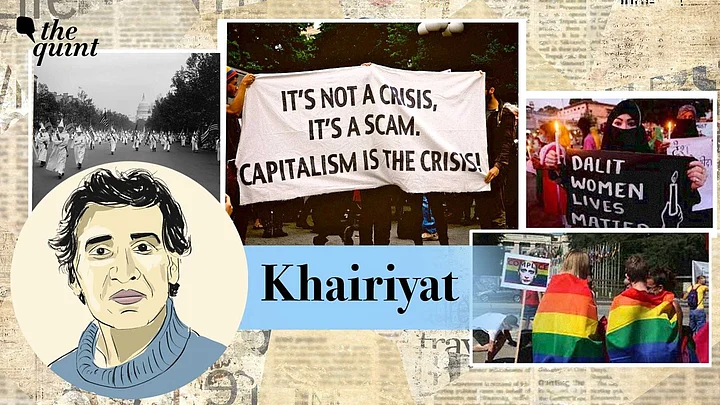For quite some years now, I have wondered to what extent the definitions of 'power' by recent theorists have to do with the fact that these intellectuals live in spaces where they are not likely to get their faces smashed. Definitions of violence fare a bit better at their hands, but still seem to be shaped by a similar ‘safe’ experience of life.
Let us start with power. Despite what the hoi polloi might believe, it is commonly and correctly accepted in thinking circles that power is not the same as force. Actually, as various theorists have argued, when force has to be applied, it is the sign of the fraying of power.
Power is at its highest when it is accepted rather than imposed. That is how, for example, patriarchy worked until recently, and still works in many circles.
Both men and women accepted its values and norms. Something similar can be said of racism, religious orthodoxy and colonialism, at least in the past, and of capitalism today.
The Many Vignettes of Violence
It can be argued that the moment the Ku Klux Klan had to lynch African Americans to reinforce the status quo, the power of racism was already waning. This can also be said of patriarchal or male violence against women, of upper caste attacks against Dalits, etc. This is true, and yet, the high theoretical focus on this is problematic because it ignores the fact of the blow to the face as a ‘final solution.’
Now again, theorists are right when they point out that violence has changed shape. One of my favourite living theorists, Byung-Chul Han, puts it succinctly in these words: “Today, it (violence) is shifting from the visible to the invisible, from the frontal to the viral, from brute force to mediated force, from the real to the virtual, from the physical to the psychological, from the negative to the positive, withdrawing into the subcutaneous, sub-communicative, capillary and neuronal space, creating the false impression that it has disappeared.”
Systemic Violation in the Throes of Capitalism
Bear in mind, that this definition might seem to be less applicable in places where ‘older’ forms of violence – acid on the woman, knife in the ribs are still quite common. Yet, Han and others are correct about the new kinds of violence: that excess of positivity, that depressive failure to achieve endlessly, that contractual obligation to whip yourself in the market instead of being driven by your bosses, the systemic overlooking of those who are not needed by the system. It is an endless list, getting longer by the decade. And I don’t want to object that older – physical – forms of violence persist. Every theorist knows that much, and has taken it into account.
Violence and Power Aren’t Mutually Exclusive
My objection is slightly different. One way to understand it is to look at all these theoretical works and examine how they talk of ‘power’ or even ‘violence.’ Almost always, they talk of them in the abstract, as if power exists on its own, violence happens on its own. They know it doesn’t, and yet it is in keeping with their space in life that they experience power, even violence, in the abstract.
What if we refuse to indulge in this abstraction of power or violence? What if we tell ourselves (something all of us, including high theorists, know) to look at who is empowered, who commits the violence?
Patriarchy Normalises Gender-Based Crimes
No human violence takes place on its own. It is this that recent theorists find so difficult to address. They know it to be the case but they fail to engage with it. Because, finally, no patriarchal system would survive without the ability of many men (and women) to inflict visible violence on women who refuse or fail to follow its rules.
That is why you come across public ‘rationalisation’ of rape or acid attacks. The hard-core patriarch wants patriarchy to work without visible violence, true, because then it is power at its ‘mostest.’
But he also knows that visible violence is a necessary instrument. Both its threat, and its possibility which needs to be publicly enacted on occasions. This can be said of many other things, such as racism, xenophobia, religious orthodoxy, homophobia, etc.
What is it that happened to us in the 1970s or 80s, starting with high theory and diverting in the subsequent decades? It cut across the middle left and the middle right; it included all liberals.
Of course, there was an intellectual necessity to treat power in all its complexity. It was never a version of the caveman’s club that some people appear to have imagined.
There was, and remains, the need to look at violence in all its forms: not just the violence of the fired worker who throws a stone, but also the violence of the capitalist who fires him.
Theorising Violence
But when did the body – which finally is what power and violence impact – disappear in all these highly theorised discussions? Or when the body re-entered them, it had itself been theorised into abstraction!
I cannot help suspecting that this had to do with the body of the high theorist being safe in spaces where power, if not advantageous, was at least negotiable, and where violence was never a blow in the face. Or worse. That might be one of the reasons why all our theorising, no matter how brilliant, has had no influence on power and no impact on the violence out there.
(Tabish Khair, is PhD, DPhil, Associate Professor, Aarhus University, Denmark. He tweets @KhairTabish. This is an opinion article and the views expressed are the author’s own. The Quint neither endorses nor is responsible for them.)
